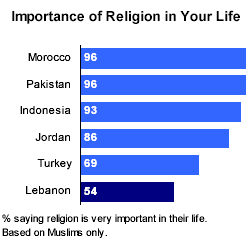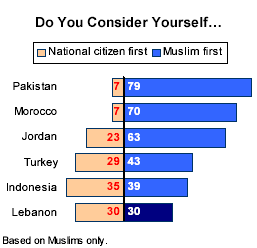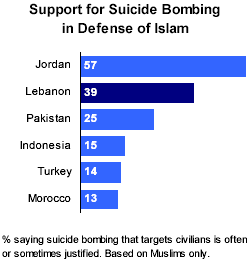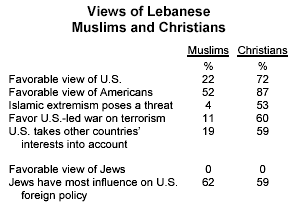by Richard Wike and Juliana Menasce Horowitz
 The ongoing conflict between Israel and Hezbollah has again drawn the world’s attention to Lebanon and its complicated mosaic of religious sects. Despite its small population — just under four million people — Lebanon is the most diverse country in the Middle East, with significant Sunni, Shia, Christian, and Druze populations. On many issues, Lebanon’s Muslim majority shares the views of other Muslims in the Middle East and throughout the world, especially its antipathy toward Israel (Lebanon’s Christian minority also shares this antipathy). But on other issues, Lebanese Muslims stand apart. In particular, data from a Pew Global Attitudes survey conducted in May of last year (this year’s survey did not include Lebanon) shows that Lebanon’s Muslims are considerably more secular in their outlook than Muslims in other countries.
The ongoing conflict between Israel and Hezbollah has again drawn the world’s attention to Lebanon and its complicated mosaic of religious sects. Despite its small population — just under four million people — Lebanon is the most diverse country in the Middle East, with significant Sunni, Shia, Christian, and Druze populations. On many issues, Lebanon’s Muslim majority shares the views of other Muslims in the Middle East and throughout the world, especially its antipathy toward Israel (Lebanon’s Christian minority also shares this antipathy). But on other issues, Lebanese Muslims stand apart. In particular, data from a Pew Global Attitudes survey conducted in May of last year (this year’s survey did not include Lebanon) shows that Lebanon’s Muslims are considerably more secular in their outlook than Muslims in other countries.
Although Lebanese Muslims consider Islam an important part of their lives, they place less emphasis on their faith than do Muslims elsewhere. In the six predominantly Islamic countries surveyed, Muslims in Lebanon are the least likely to say religion is very important in their life — just over half (54%) say religion is very important, compared with 69% of Muslims in Turkey, 86% in Jordan, and more than 90% in Indonesia, Pakistan, and Morocco.
 Muslims in Lebanon are also less likely to identify primarily with their religion, rather than with their country, with equal numbers saying they think of themselves first as Muslim (30%) and saying they identify primarily as Lebanese (30%). Elsewhere, majorities or pluralities of Muslims identify more strongly with Islam than with their nationality — in many cases by lopsided proportions. Even in Turkey — a country with a long-running tradition of secularism — Muslim identifiers outnumber those who identify primarily as Turks by 13 percentage points.
Muslims in Lebanon are also less likely to identify primarily with their religion, rather than with their country, with equal numbers saying they think of themselves first as Muslim (30%) and saying they identify primarily as Lebanese (30%). Elsewhere, majorities or pluralities of Muslims identify more strongly with Islam than with their nationality — in many cases by lopsided proportions. Even in Turkey — a country with a long-running tradition of secularism — Muslim identifiers outnumber those who identify primarily as Turks by 13 percentage points.
Moreover, Lebanese Muslims are less concerned about the global role of Islam — just under half (47%) say it is very important for Islam to play a more important and influential role on the world stage. In contrast, 84% of Muslims in Morocco and 73% in Jordan would like to see Islam play a major role. Only Turkish Muslims, at 43%, show less interest in Islam’s global influence.
Views on Terrorism
 Despite their relatively secular worldview, Lebanese Muslims are among the most supportive of terrorist acts in the name of Islam. In 2005, 39% said suicide bombing and other forms of violence against civilians are often or sometimes justified in order to defend Islam from its enemies. Only Jordan, at 57%, registered more support for suicide attacks.1
Despite their relatively secular worldview, Lebanese Muslims are among the most supportive of terrorist acts in the name of Islam. In 2005, 39% said suicide bombing and other forms of violence against civilians are often or sometimes justified in order to defend Islam from its enemies. Only Jordan, at 57%, registered more support for suicide attacks.1
In Morocco, Turkey, and Indonesia, fewer than one-in-five Muslims believe such attacks can often or sometimes be justified.
Lebanese Muslims also express considerable support for suicide bombing in Iraq — roughly half (49%) said suicide attacks against Americans and other westerners in Iraq are justifiable, a level equal to that found in Jordan (49%) and only slightly less than in Morocco (56%), which recorded the highest level of support.
However, the world’s best known proponent of suicide terrorism, Osama bin Laden, receives little support among Lebanese Muslims. Only 4% say they have a lot or some confidence in bin Laden to do the right thing in world affairs. This is the lowest level of support for the al Qaeda leader found in any of the six predominantly Muslim countries surveyed.
Muslims and Christians in Lebanon: Agreement on Israel, Differing Views of the U.S.
Despite widespread sectarian violence during their country’s 1975-1990 civil war, today Lebanese Muslims and Christians generally have positive attitudes toward one another. Fully 86% of Muslims have a favorable opinion of Christians, by far the highest rating of Christians by any Muslim public. At the same time, 82% of Christians have a positive view of Muslims.
Attitudes toward Jews, however, are quite another matter. Even before the current conflict, negative sentiments about Jews and Israel were widespread in Lebanon, and they were not confined to the Muslim community. Indeed, no one in our Lebanese sample, Muslim, Christian, Druze, or otherwise, said they had a favorable view of Jews. Of course, negative attitudes towards Jews are not uncommon in the region — in neighboring Jordan, zero respondents had a favorable view of Jews, and Morocco and Pakistan also posted favorable ratings for Jews in the single digits.
Regarding the Israeli-Palestinian conflict, prior research has generally shown the Lebanese to be pessimistic about a two-state solution. A 2003 Pew Global Attitudes survey found that three-in-four Muslims (75%) and one-half of Christians (50%) agreed with the statement “the rights and needs of the Palestinian people cannot be taken care of as long as the state of Israel exists.”
 Both Lebanese Muslims and Christians are also suspicious of Jewish influence over U.S. foreign policy. When read a list of groups — including Jews, corporations, Christian conservatives, the media, the military, liberals, and ordinary Americans — and asked which one has the most influence on American policy towards other countries, 62% of Lebanese Muslims and 59% of Lebanese Christians said Jews are the most influential. This belief was also widely held in the other Arab countries surveyed — 60% of Jordanians and 50% of Moroccans also said Jews have the most power over America’s international policy.
Both Lebanese Muslims and Christians are also suspicious of Jewish influence over U.S. foreign policy. When read a list of groups — including Jews, corporations, Christian conservatives, the media, the military, liberals, and ordinary Americans — and asked which one has the most influence on American policy towards other countries, 62% of Lebanese Muslims and 59% of Lebanese Christians said Jews are the most influential. This belief was also widely held in the other Arab countries surveyed — 60% of Jordanians and 50% of Moroccans also said Jews have the most power over America’s international policy.
Although Lebanon’s Muslims and Christians agree that Jews have wide-ranging influence in the United States, they disagree sharply in their attitudes toward the United States and toward American foreign policy. Only 22% of Muslims have a favorable opinion of the U.S. — a level consistent with anti-American sentiments found throughout much of the Muslim world. However, nearly three-in-four Christians (72%) have a favorable view of the U.S.
Muslims and Christians also differ with respect to attitudes toward the American people: 52% of Muslims have a favorable view of Americans, compared with 87% of Christians. In countries throughout the world, Pew Global Attitudes surveys have generally found that people give more favorable ratings to Americans than to the United States, and this is largely true in Muslim countries as well. However, the gap between perceptions of Americans and of the U.S. is particularly large among Muslims in Lebanon. Among other Muslim populations, perceptions of Americans tend to reflect perceptions of America more closely.
Muslims and Christians in Lebanon also hold sharply different views of U.S. actions in the international arena. For example, Muslims are considerably more likely to believe America acts unilaterally on the world stage. Only 19% of Muslims believe the U.S. takes into account the interests of countries like Lebanon a great deal or a fair amount when making foreign policy decisions, compared with 59% of Christians. And only 11% of Muslims favor the U.S.-led war on terrorism; however, 60% of Christians back U.S. anti-terrorism policies.
Another issue on which Muslims and Christians disagree is the threat posed to their country by Islamic extremism. Despite the dominant position of Iranian-backed Hezbollah in southern Lebanon, in last year’s survey only 4% of Lebanese Muslims considered Islamic extremism a very or fairly great threat to the country, the lowest percentage of the six Muslim publics. Meanwhile, Lebanon’s Christian minority sees this issue quite differently: 53% say Islamic extremism poses a very or fairly great threat.
Notes
1The survey was conducted prior to the November 2005 terrorist attacks in Amman, Jordan. Subsequently, the 2006 Global Attitudes survey, which was conducted March-May of this year, found that the percentage of Jordanians who believe suicide bombing can often or sometimes be justified dropped to 29%. The 2006 survey was not conducted in Lebanon.


